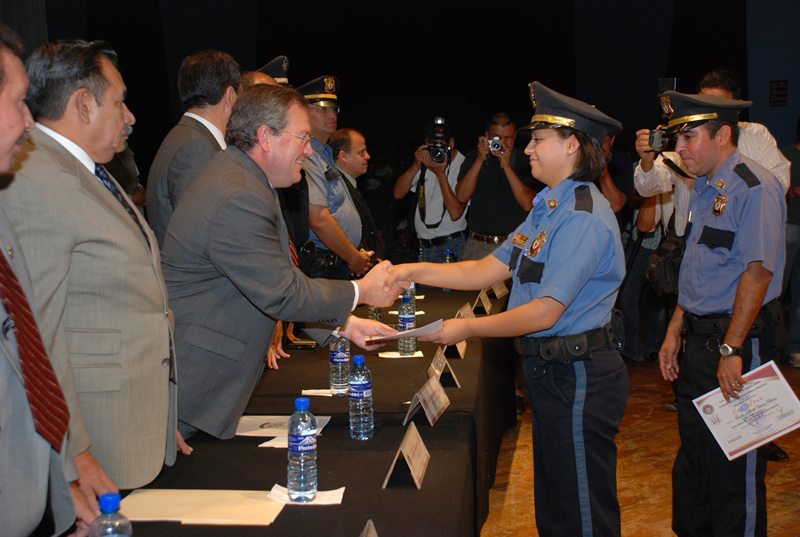CIUDAD JUAREZ, Chihuahua – When he was elected as Mayor of this border city in 2007, José Reyes Ferriz had no idea that he had won the most difficult municipal job in the world, running a city that had earned the title of the “murder capital of the world.”
The chaos and terror of a war between drug cartels that has killed some 7,000 persons in Juarez since he took office, Reyes Ferriz said in an exclusive interview with Borderzine.com, forced him to focus his efforts on insuring the safety of the citizenry.
With that in mind, Reyes Ferriz placed the reconstruction of the city’s police force at the top of his list of priorities. Corruption was ingrained in all branches of the police force bureaucracy, he said.
“Part of the police force reconstruction was recruiting and training new officers. The government hired 2200 new officers to bring the total to 3000. Today these officers are working for us and are a major part of the plan in finding the solution for Juarez,” Reyes Ferriz said.

Juarez Mayor, José Reyes Ferriz, congratulates officers from the 2008 class. (Courtesy of Ciudad Juarez)
The mayor said he also saw the need to involve the citizens of Juarez in their own safety. Hoping that the changes in the police department would allow the public to regain faith in law enforcement, he also started a local Crime Stoppers program. Juarez became the first city in Latin America to initiate the program, he said.
“Like any other police force in the world, Juarez’s police force needs the help of the community, but the years of corruption left little faith in the system in Juarez,” Reyes Ferriz said. “Crime Stoppers gives the population the opportunity to participate again and to believe in the future.”
The mayor said that the response to the program was overwhelming. With more than 2000 meetings and more than 25,000 participants, Juarez has generated three times more “actionable calls” than any other city in the world and the information received has led to important arrests, he said.
In spite of the stress on security, Reyes Ferriz said his administration also accomplished goals that go beyond reacting to the drug war and the general environment of criminality that it spawned.
“The origins of the problems in Juarez are numerous and any can be traced to as early as adolescence,” he said. “Juarez did not have daycares for children over four years old. Therefore children grew up on the streets.”
To attack this problem, he said, the city built some 50 day-care centers. “This was created so children can be raised with morals and ethics,” he said. The program includes computer classes, English and special tutoring.
“On a grading scale from one to 10, children have improved a point and a half and parents are pleased with the results. They come home to find their children already fed and started on their homework,” Reyes Ferriz said.
The city’s lack of child-care services, however, is only part of the problem. The dropout rate in the city schools was also high. Juarez is the Mexican city with the highest secondary school dropout rate(*). Many students drop out because they need money and have to work.
The mayor’s program to address that issue included new buses to take students back and forth from school and free uniforms for needy students. With the help of federal government funding Juarez is also creating better high school programs for the city, the mayor said. The west side of Juarez has well over 500,000 inhabitants but only one high school. Now, four new high schools are being built on the west side.
The mayor said that these programs could be the basis of a better future for Juarenses. “Trying to solve the problems with the drug cartel cannot be done in a short time, but these programs are a start to a solution and a better more hopeful future for the younger generations,” Reyes Ferriz said. “We already lost a generation and we cannot afford to lose our future generations.”
_____
(*) According to data provided by the National Institute for the Education of Adults (INEA), 30.8% of the population 15 and older haven’t finished their secondary education in the state of Chihuahua (Year 2000).


Learn how to install the Crime Stoppers Leave A Tip Tab on your facebook page here: http://facebook.com/csiworld